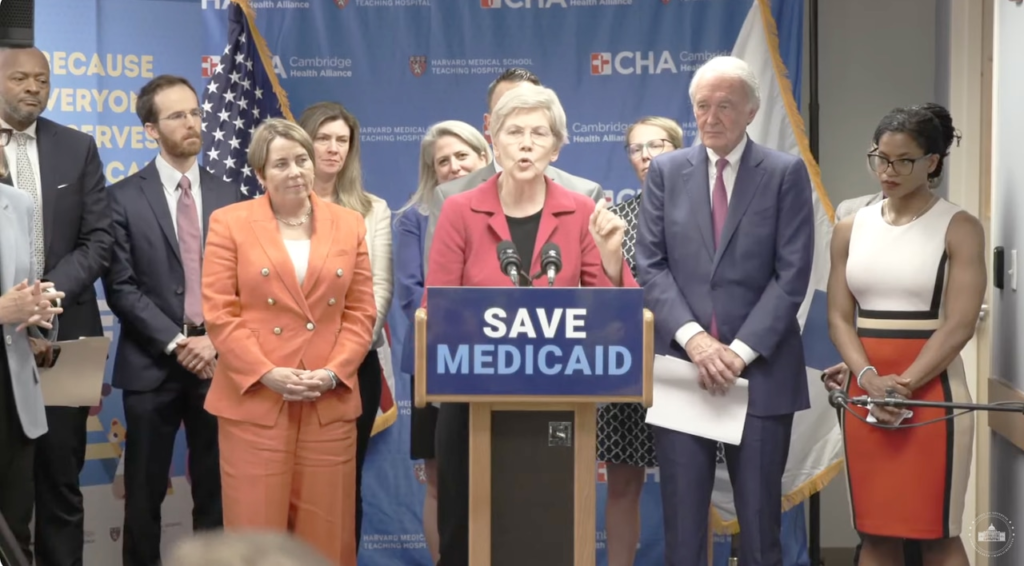When you’re talking about a sprawling federal program like Medicaid, whose cost runs to the billions of dollars, it’s easy to get bogged down in the numbers.
In Revere on Tuesday, Dr. Michael Curry wanted to talk about people instead: The tens of millions, including thousands in Massachusetts, who have benefited from the joint state-federal health care program that dates to the headiest days of the civil rights era.
There’s the middle-aged woman from Southeast Massachusetts who lives with chronic pain and post-traumatic stress disorder.
She used MassHealth, as Medicaid is known in the Bay State, to connect with a local health center that helped her with her problems, Curry, the president & CEO of the Massachusetts League of Community Health Centers, reflected.
Or the older man from Boston, living with diabetes, who needs access to care and medication to manage his chronic health condition. Without them, he’s too dizzy to walk without two canes to support him, and he could end up in a hospital emergency department after a bad fall.
“This is real stories,” Curry said.
And those are the people — and many more like them — who stand to lose if the deep Medicaid cuts included in President Donald Trump’s domestic policy mega-bill become the law of the land, Curry and a cadre of the state’s Democratic politicians warned Tuesday.
They included Gov. Maura Healey, Democratic U.S. Sens. Elizabeth Warren and Ed Markey, state Sen. Lydia Edwards, D-3rd Suffolk, and Revere Mayor Patrick M. Keefe Jr.
To deliver the message, they gathered at Cambridge Health Alliance’s Revere Care Center, which provides critical services to its community, with many patients on Medicaid.
As it’s currently written, the bill that passed the U.S. House by a single vote last week would reduce Medicaid spending by nearly $700 billion over a decade, according to an analysis by the Congressional Budget Office.
That would cost the state’s health care system $1.75 billion, affecting 250,000 people statewide, according to the Healey administration.
“This is not, as they would describe it, a scalpel — we’ve heard that term before — a scalpel to the problem,” Healey said. “It really is just a blunt-force axe. And it’s going to fall on a lot of people here in Massachusetts and a lot of people around this country. People will get hurt and people will die. And it will raise costs for everyone else.”
The bill still has to clear the Republican-controlled U.S. Senate, where lawmakers are eyeing further changes to the legislation. If that happens, the bill will require further action by the House before it can be sent to Trump for his signature.
Republicans can only afford to lose three votes if they hope to pass the bill by a simple majority. Markey, who sits on the Senate’s Health Committee, has cast the fight over the bill as a “historic battle.”
“This is going to be the defining battle over the Trump administration’s ‘Make America Sick Again’ agenda, and whether or not Donald Trump and Robert F. Kennedy Jr. are going to be successful in implementing this gutting of essential health care programs for our nation,” the Malden pol said.
Kennedy helms the U.S. Department of Health and Human Services, which has oversight of Medicaid and Medicare, two of the nation’s three third-rail social safety net programs.
With its suite of tax cut extensions, reductions to food aid, and other spending cuts, the bill is the “greatest transfer of wealth — from just one piece of legislation — from the poorest Americans to the richest Americans ever before in U.S. History,” Warren said.
“Think about that: These guys are actually out there making history by taking away from hardworking families, from people down on their luck, from seniors, from little babies, so that a handful of billionaires and corporate CEOs can get more giveaways from the government,” Warren continued. “That is the Republican plan. Billionaires win, everyone else loses.”
And for Curry, that once again comes down to faces, and even his own family’s history.
Growing up in Roxbury, his mother, a housekeeper, depended on MassHealth coverage because her job didn’t come with health benefits, he said. And she couldn’t afford to provide them on her own.
So many others on MassHealth have a similar story. They’re working full-time or part-time, or they’re not working at all because they’re caregivers, he said.
“ So as we talk about fraud, waste and abuse, as we talk about changes in Medicaid policy, I want to bring a face to that,” he said.


